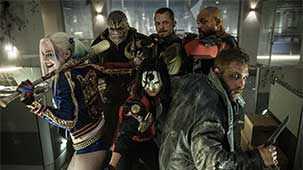You’re good with secrets, so here’s mine: I really wanted to like Suicide Squad.
Sadly, no matter where on the objective/subjective spectrum you might fall, I think most people with eyes and ears and a capacity to think critically – even those like me, who, despite overwhelming evidence to the contrary, were still kind of excited to see it – would agree that it’s pretty terrible.
But I’m more curious to know why it’s so terrible. What happened, in the course of this movie’s development, that turned the end results so lumpy and schizophrenic and abhorrent and sometimes thrilling but mostly confusing and basically one of the strangest and most disturbingly fetishistic major studio releases of the last decade?
Somewhere beneath all the muddy special effects and egregious story inconsistencies, lies the fun, cool, unique film that fans were hoping to see. Every so often, you catch glimpses of it: a clever exchange of dialogue; a moment of genuine surprise; a well-crafted ten-second sequence. But all around those small moments of delight swirls an impenetrable electric garbage-storm. You know, like the impenetrable garbage-storm that our onscreen heroes spend much of their time marching towards. Its purpose is completely unknown – it’s just inexplicably there and serving no function other than to, I guess, look kinda neat.
So, Fedor, as the production assistant who was responsible for controlling the outgoing flow of information from the set – letting slip those blurry photos and gossipy bits that might ignite excitement, suppressing the others – I have to ask: when, exactly, did the cast and crew give up? Because there is a tangible sense that portions of this movie were lovingly crafted. But the stuff around it is so sloppily executed, so tangibly the afterthought of an afterthought of an afterthought, that I can’t bring myself to believe that the people responsible for bringing it to life – yourself included – could possibly think that it’s representative of their best efforts (even though many of the cast members seem far more committed to the material than they have any rational reason to be).
A few years ago, I called David Ayer’s Sabotage “sadomasochistic, obscene, hyper-violent, obnoxious, inhumane, dim-witted, turgid, and generally unpleasant.” Those descriptors feel just as true for Suicide Squad, even though this particular expression of Ayer’s militaristic worldview somehow managed to get a PG-13 rating. But it was another adjective that stuck in my head as I sat through the sound and folly. When I used the term fetishistic earlier, I wasn’t talking about Harley Quinn’s high-cut sequined underpants or The Joker’s predilection for lovingly caressing people’s faces, but rather the film’s creepy pseudo-sexual obsession with firearms.
For a film about people with superpowers – flame projection, crocodile strength, teleportation – a lot of people are carrying guns. And a lot of people get shot. A lot. A lot. The film does its best to mitigate the horror of the high body count by introducing a nonsensical plot element by which the average citizens of Midway City are turned into morphing blob-monsters, giving our anti-heroes plenty of human-shaped (but not quite human) targets to shred with bullets.
But it’s not the actual enactments of that violence that freaked me out; it was the prelude to those moments, in which guns of various types are gazed at and caressed and whispered to and whipped out in heroic slow-motion. We get that now-classic boot-level shot of the shell casings tinkling on the ground. Even the blob-monsters are, for some reason, carrying assault rifles, and exchange fire with our heroes.
These are the “lovingly-crafted” moments of the movie I was referring to above. And maybe they answer my question about how Suicide Squad ended up in such a sad state. Forget the rumors about reshoots, Jared Leto’s method madness, or studio micro-management—if the premise of the film is indeed build around the vulgar notion that the guys with the bigger guns and better aim are, despite the moral code to which they subscribe, heroes, then maybe there was never any hope.
Sincerely,

Jared







